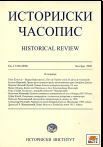Балдуин од Еноа и "номадска дипломатија " Латинског царства
Baldwin of Hainaut and "the Nomadic Diplomacy" of the Latin Empire
Author(s): Aleksandar UzelacSubject(s): History
Published by: Istorijski institut, Beograd
Keywords: Baldwin of Hainaut; William of Rubruck; Emperor Baldwin II; Sartaq; Latin Empire of Constantinople; Mongols; Cumans; Bulgaria; diplomacy
Summary/Abstract: In his famous relation, Franciscan missionary and traveler William of Rubruck makes two references to the diplomatic mission of Baldwin of Hainaut, a noble of Latin Empire of Constantinople. According to Rubruck, he conducted talks with Batu’s son Sartaq and went to the Еast as far as Mongolia. Baldwin of Hainaut is mentioned in the sources for the first time in 1219, as a witness in one document of Conon of Bethune, the then regent of the Empire. Two decades later, he participated in the making of an alliance between the Latin Empire and the nomadic Cumans, when he married a daughter of Cuman chief Soronius. His voyage accross the Mongol Empire took place sometime between 1249 and early 1253. Short-term alliance with Cumans and subsequent mission of Baldwin of Hainaut, are a vivid testimony of the importance of nomadic factor in the foreign policies of the Latin Empire and of the political role of the Mongols in Southeast Europe in the mid Thirteenth Century. At the time, the Latin Empire was in dire straits: pressed by the Empire of Nicaea and left without any support from the West. Therefore, the emperor and the political elite in Constantinople turned their attention to the East, seeking alliance with Mongols. The initial contacts might have been prompted by the fact that pope Innocent IV and French king Louis IX had already came into touch with the Mongol power. However, the circumstances, aims and goals of Baldwin’s mission were different from these of his predecessors, papal envoy Ascelin of Cremona and Andrew of Longjumeau, potentiary of the French king. Baldwin of Hainaut first visited prince Sartaq and Mongols in Eastern Europe. This decision might have been influenced by several other factors: Venetian merchants have already established their presence in the lands under Mongol control on the northern shores of the Black Sea; Bulgaria, neighbor and former adversary of the Latin Empire, was under their overlordship and Mongol influence was already firmly present in the Balkan lands; finally, prince Sartaq himself was a Nestorian Christian and at the time a major political figure in the western parts of the Mongol domains.Although mission of Baldwin of Hainaut may have been just an ambitious political adventure, without far-reaching consequences on the fate of the Latin Empire, its outcome was not a failure. It led to the establishment of the diplomatic relations between Constantinople and Mongols in the Black Sea region and in wider context by facilitating Rubruck’s enterprize it had an important impact on subsequent European discovery of Asia and Far East. His voyage to Mongolia and back, marriage with Cuman princess and impressions on Sartaq reveal that Baldwin of Hainaut was extraordinary and gifted man, better suited to deal with Mongols and able to achieve more than his contemporaries – the members of the mendicant orders.
Journal: Историјски часопис
- Issue Year: 2012
- Issue No: 61
- Page Range: 45-65
- Page Count: 21
- Language: Serbian

